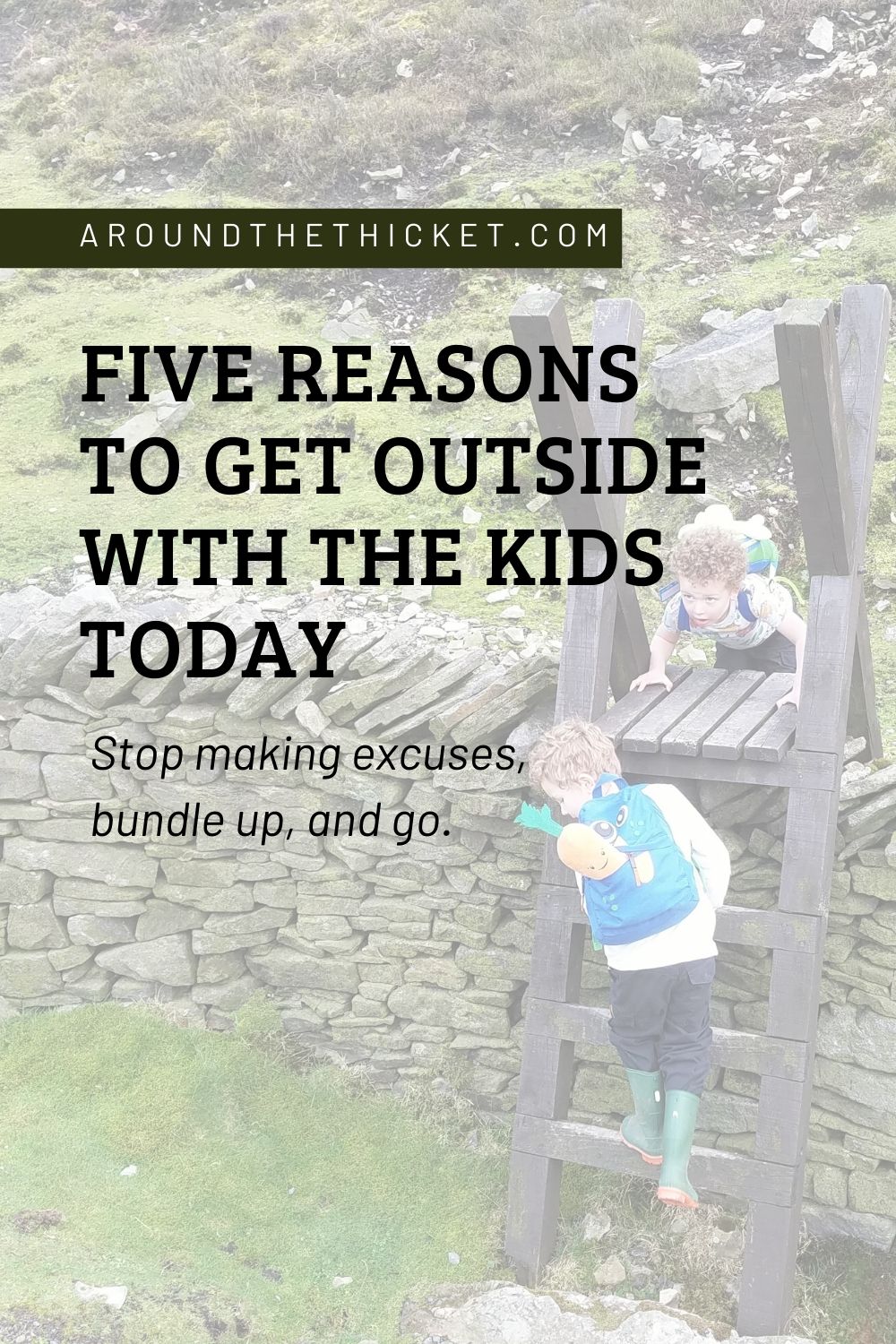Five Reasons to Stop Making Excuses, Bundle Up, and Get Outside with the Kids
My relationship with the outdoors, historically, is mixed. I remember enjoying some outside activities when I was growing up in Indiana. As a family, we went hiking in state parks and wandered to the creek near our house. These are fond memories, but I have even more memories of sluggish, sweaty summers of band camp, snow days that were too windy for sledding, and nervously heading to the basement for tornado warnings.
As an adult, I have tended to see the outdoors as either a place I go through to get somewhere else, or as a place I visit for leisure before retreating back into my home. With this utilitarian perspective, it’s not surprising that I often drag my feet when it comes to getting outside. I’m not happy about it, actually, and I want to change.
A Vision for an Outdoor Family
Carl’s and my vision for our family is that our boys would grow up loving the outdoors. We want nature to be just as much a part of their home as our house. We realize, though, that for this to happen, we must take responsibility for taking them outside, and often. Modelling passion for and curiosity about the world outside is an essential part of our home atmosphere.
Unfortunately, it’s all too easy to make excuses.
- It’s raining, or it was raining and now it’s muddy.
- The baby just went down for a nap. By the time he’s up, the toddler will need a nap. I can’t leave the house!
- I’m exhausted.
- Where will we even go? We hardly even have a garden.
- I just don’t feel like it.
I imagine this sounds familiar, but as I read about things like nature-deficit disorder (affiliate link), the benefits of forest schools, and the alarming rise in childhood obesity, I can’t ignore the research (or even the common sense) any more. It’s time to stop moaning, grab my raincoat or sunglasses or both, and get out the door with my kids. Here are five of the many reasons why.
1. Going outside is healthy for the kids, and me.
Being outside lends itself to walking, running, and climbing, using big voices and making big movements. Even just standing up instead of sitting down is beneficial to health. This is just physically – time spent in nature, even in short spurts, has been shown to have lasting effects on mental health, meaning both I and the children are less stressed and more calm for the rest of the day.
2. Natural places are superb for developing gross motor skills.
The problem with the staircases and the level floors in your home is that they are extremely predictable. The tread on your stairs is probably equal for every step. This means that once Junior goes up and down a few times, he doesn’t have to rely on his senses to use them; he goes on autopilot. In order to really challenge and develop his gross motor skills, he needs to move in situations where he can’t easily predict how to move around. When the setting is unpredictable, he must call on all his senses to learn to move around. He needs a variety of surfaces, slopes, and places to climb, and the outdoors is perfect for this.
3. Nature is a rich, complex learning environment.
Grass, rocks, bugs, clouds, flowers, birds, ponds, beaches, I could go on for ages. For all the pins on Pinterest on sensory play activities and toys, there is an amazing sensory world right outside the door. The outdoors stimulates all the senses. You feel the the wind, taste blackberries, smell apple blossoms, see the sun reflecting on a puddle and feel mud squelching through fingers. It is free. Once you get out the door, it is effortless, because, as Charlotte Mason said, you have ‘put the child in the way of things worth observing’.
4. The outdoors holds lots of opportunity for risk taking.
Kids have a healthy need to test their strength and to risk failure. In fact, not having opportunities to take risks when they are young mean that they engage in riskier behavior when they are older. This is because they simply haven’t developed their senses of self-awareness and self-confidence. Being outdoors means that there are trees to climb, creeks to ford, maybe even a fire to cook over or a hatchet to use. Of course, it’s important to supervise kids. We should help them, if needed, when they are doing something risky, but having the experience is really important. I really appreciate Joan Almon’s perspective at Community Playthings:
When children are given a chance to engage freely in adventurous play they quickly learn to assess their own skills and match them to the demands of the environment. Such children ask themselves—consciously or unconsciously—“how high can I climb”, or “is this log across the creek strong enough to support me?” They become savvy about themselves and their environment. Children who are confident about taking chances rebound well when things don’t work out at first. They are resilient and will try again and again until they master a situation that challenges them—or wisely avoid it, if that seems best.
5. Early experiences are formative, and will likely lead to a love of the outdoors later on.
These days, I wish I had cultivated more interest in the natural world as a child. I wish I would to have learned the names of plants and trees from my horticulturist mom. That I would have tested my mettle so I could now scramble over the top of the Cat Bells with confidence instead of clinging to the rocks for dear life. I wish I simply had developed an intrinsic desire to be outside.. Despite this, I trust that it’s not too late for me. While I learn to love and respect the outdoors on a less superficial level, my boys will catch my curiosity and passion. They will have the encouragement, opportunity and time to get to know the outdoors personally. This will help them build an affection that will last throughout their lives.
It’s not just a hunch though. Research into forest schools has shown that kids who regularly attend forest school sessions are more likely to ask their parents to take them outside during other times of the week. Richard Louv also points out in Last Child in the Woods (affiliate link)that a common thread that unites noted environmentalists and conservationists is extended time outdoors in their youth, and an adult who taught them about it. So while I won’t take complete responsibility for their relationship with the outdoors as adults, I think it’s safe to say that Carl and I are likely to play a pretty major role.
Taking Action to Get Outside
So as easy at it is to stay inside, I am compelled to go outdoors. If it is raining, we will wear our wellies. When naps don’t line up, I’ll get dinner ready early so we can head out before bed. If I’m exhausted, we’ll have a picnic instead of a long walk. When I don’t know where to go, I’ll look at a map. And if I just don’t feel like it, I will read back through this list and remind myself exactly why this is so important.








One Comment